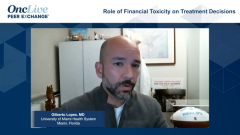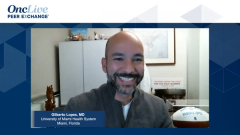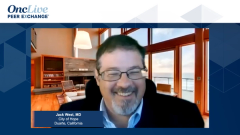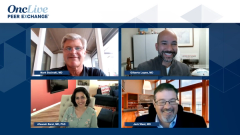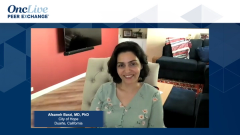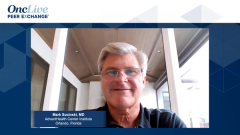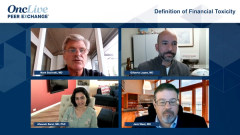
EGFR-Targeted TKIs in NSCLC and Cost
Mark Socinski, MD, Gilberto Lopes, MD, and Jack West, MD, provide an overview of the role of EGFR-targeted TKIs in NSCLC and the costs.
Episodes in this series

Mark Socinski, MD: Gilberto, give us a quick overview of EGFR inhibitors and their role in the first-line treatment of EGFR-mutant disease. What are the NCCN [National Comprehensive Cancer Network] Guidelines? What do you typically do in the first-line setting with these patients?
Gilberto Lopes, MD: We’ve been using, as you know, gefitinib [Iressa] and erlotinib [Tarceva]—first-generation TKIs [tyrosine kinase inhibitors]—for about 20 years, and we’re now at a new generation where we tend to use osimertinib [Tagrisso] as our first-line agent in the United States, based on phase 3 trial data showing that you get better PFS [progression-free survival] and better overall survival, even if just by a few months, as well as lesser toxicity. We wouldn’t discuss the cost of osimertinib if it wouldn’t have to be so expensive—we’re talking about a factor of 10 when you put it in—but now we have generic erlotinib in places like Canada and lots of countries in Latin America and Asia. It truly is a big difference in price, so even though it’s an amazingly effective drug, we discuss cost because it’s not a cost-effective therapy when you do usual health technology assessment. But without a doubt, it’s the No. 1 go-to option that we have in the United States.
There are different options as well. We also have the approval of the combination of erlotinib [Tarceva] with ramucirumab [Cyramza], the EGFR and VEGF pathway. In addition, in GI [gastrointestinal], we often don’t do those 2 pathways together because you don’t get better results, you might get more toxicity and possibly worse outcomes. But in the lung cancer arena, for EGFR mutants, it has been chosen. In some places in Asia, it has become the preferred choice for first-line treatment because you get a median progression-free survival that’s similar to the PFS with osimertinib. But you might have certain benefits—I don’t quite believe in them, but some of my colleagues in Asia do—such as not seeing an overall survival benefit for osimertinib vs gefitinib-erlotinib for patients who are of Asian descent or have L858R. Those benefits exist in PFS. Those are pretty much the data we have for ramucirumab plus erlotinib, so I don’t see a preference for that combination, in my opinion. I don’t see many patients in which I can’t use osimertinib. Maybe somebody who was on osimertinib and then developed CHF [congestive heart failure] would be someone you might consider, but it’s a very iffy kind of indication. I would love to hear your opinion, Jack and Mark.
Mark Socinski, MD: Go ahead, Gilberto.
Gilberto Lopes, MD: Beyond that, of course, if cost is an issue and you can’t have osimertinib covered by insurance, you can still use first-line EGFR TKIs—that would be better than chemotherapy alone.
Mark Socinski, MD: Jack, does cost come into your thinking in this space?
Jack West, MD: It hasn’t historically because we’ve always had a high price for EGFR inhibitors, which have gone up overtime. But osimertinib set a new benchmark for cost and also for efficacy. You’re going to go with the best treatment you can in this setting. The cost vs the efficacy, or vice versa, hasn’t been so out of proportion that it’s challenged our thinking. We haven’t had a good alternative. Erlotinib is way less expensive, enough to justify its modest inferiority. In general, in the United States at least and in much of the world, when you have osimertinib available. Not because it’s a great value but because it’s good at what it does, and we haven’t had something that’s been a competitor for it.
Mark Socinski, MD: Gilberto or Jack, when you think about 2 of the competing first-line options that have the highest PFS, if we use that as our primary end point, that’s osimertinib vs erlotinib plus ramucirumab. Does anyone have a sense of what’s more expensive or what’s cheaper when you factor in everything with regard to financial toxicity?
Gilberto Lopes, MD: They also have to factor that in for the ramucirumab. You’re going to have to come into the practice, and you have costs associated with the infusion center, etc.
Mark Socinski, MD: Infusion center cost? Yeah.
Gilberto Lopes, MD: That’s still cheaper, but not cheap enough that I’d consider it as 1 of the main options. I continue using osimertinib.
Mark Socinski, MD: Jack, your thoughts? Similar opinion?
Jack West, MD: No different here.
Gilberto Lopes, MD: We haven’t seen overall survival data for ramucirumab as well, so those are definitely put into consideration. If anything, you might prefer to use chemotherapy plus erlotinib or gefitinib because we have some suggestions that you might have better overall survival there, at least in Asia.
Mark Socinski, MD: We have ongoing trials with FLORA that will address that issue too, so there are more data to come.
Transcript Edited for Clarity


